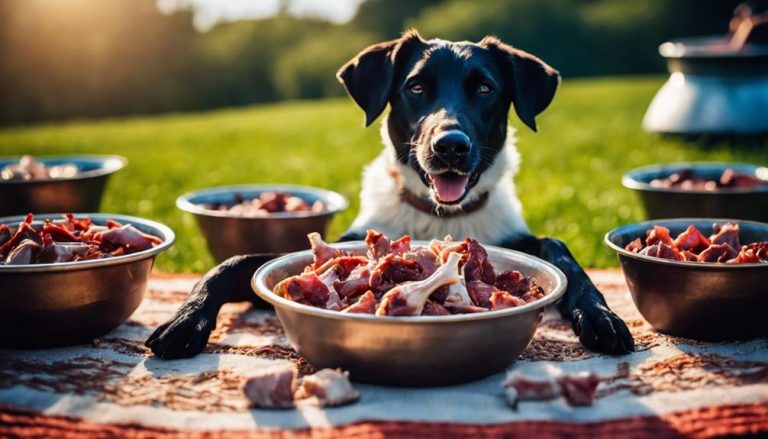Dogs and Goat Meat: Safe
Dogs can enjoy goat meat safely if it’s cooked right. It’s a nutritious choice for them, packed with protein, vitamins, and minerals. This makes it great for dogs that are very active or still growing. The key is to cook it without any spices or seasonings and start with small amounts to see how your dog reacts.
Introducing goat meat to your pet should be done slowly. Make sure the portions are appropriate to avoid any digestive issues. For dogs with allergies or sensitivities, goat meat might be a good option since it’s often less likely to cause reactions. It’s always a good idea to check with your vet before making any major changes to your dog’s diet to ensure it’s the right move for their health.
Key Takeaways
- Goat meat is safe and nutritious for dogs.
- It’s an allergy-friendly alternative protein.
- Introduce it gradually and consult a vet.
Benefits of Goat Meat
Feeding your dog goat meat can significantly improve their health thanks to its high protein, low fat, and rich vitamin and mineral content. This type of meat is especially good for dogs that are very active or still growing. It helps build and repair muscles due to its essential amino acids.
Goat meat is also allergy-friendly, which helps dogs maintain a healthy weight. This is particularly useful for dogs that need a diet based on lean protein. The variety of vitamins and minerals in goat meat supports various aspects of a dog’s health, from their immune system to their bone strength.
For dogs with food sensitivities, goat meat is a great option. It’s considered a novel protein, which means it’s less likely to cause allergic reactions. This can help promote better digestive health for your pet. Including goat meat in your dog’s diet is a smart choice for pet owners focused on providing the best nutrition for their furry companions.
Preparing Goat Meat Safely

Ensuring goat meat is safe for a dog’s meal requires careful preparation to avoid health issues. Making goat meat a healthy part of a dog’s diet means being diligent in how you prepare it.
Always cook goat meat thoroughly to kill any harmful bacteria or parasites that might be present. It’s a good idea to avoid giving raw goat meat to dogs, as this can lead to food poisoning. Cutting the goat meat into small, manageable pieces can help prevent your dog from choking. If you decide to feed your dog raw goat meat, freezing it for a minimum of three weeks can reduce the risk of infection.
When serving goat meat to your dog, keep it plain and without any seasoning to avoid ingredients that could be harmful to them. Following these steps ensures that goat meat is a beneficial addition to your dog’s meals.
Goat Meat for Allergic Dogs
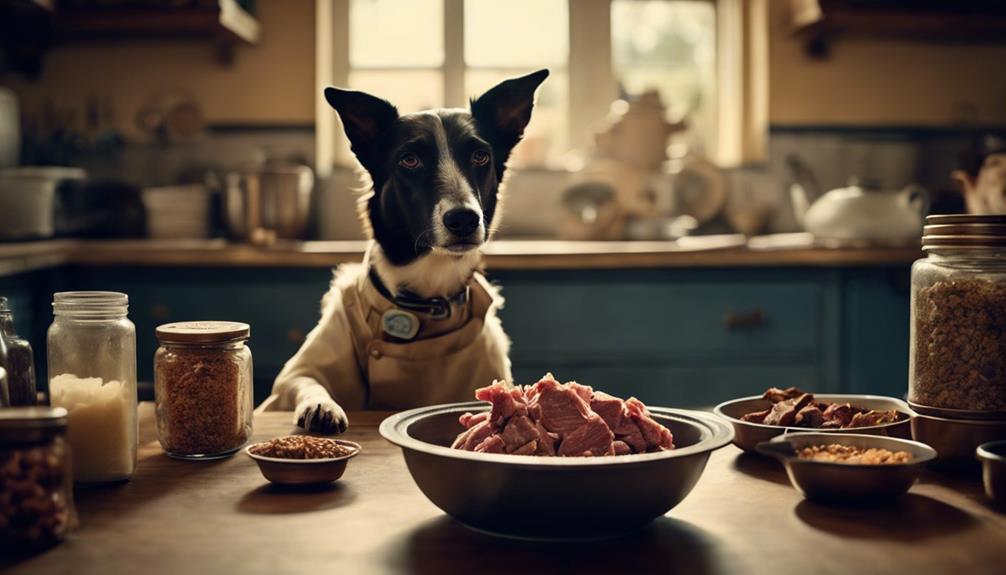
Goat meat is a great choice for dogs with food allergies. It’s less likely to cause reactions than common proteins like beef or chicken. Dogs with allergies can benefit from a diet that includes goat meat, as it’s a novel protein they’re unlikely to have been exposed to before. This can help reduce the chance of allergic reactions.
When switching your dog to a diet that includes goat meat, it’s best to do so slowly. This careful approach helps you watch for any negative reactions. It ensures your dog’s health and safety while transitioning to this new protein source.
Portion Sizes and Frequency
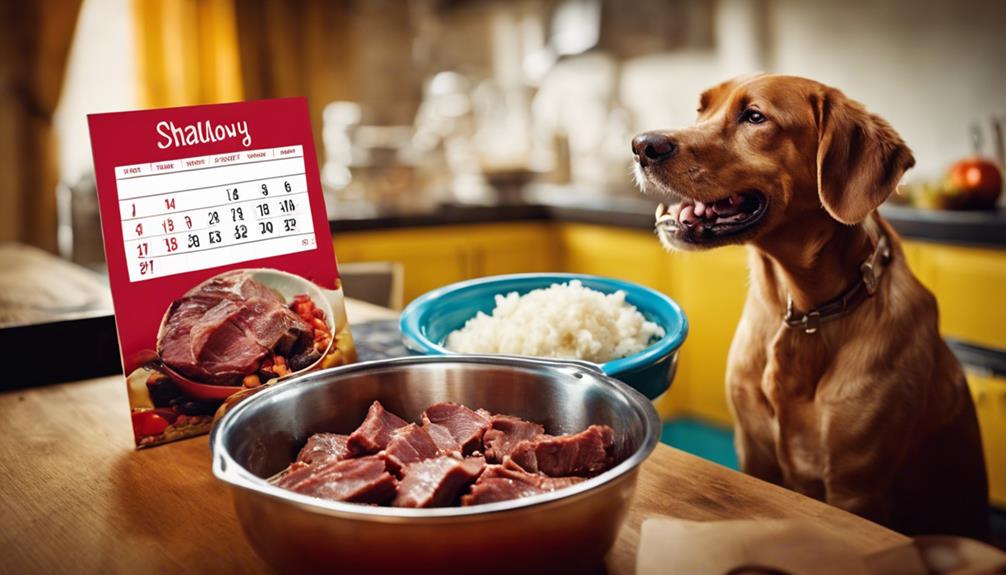
When it comes to feeding your dog goat meat, understanding the right amounts and how often to feed them is crucial for their health. Here are some guidelines to keep in mind:
- Portion size should be around one quarter pound for every 20 pounds of your dog’s weight.
- The frequency of meals depends on your dog’s specific dietary needs, so it’s best to check with a vet.
- It’s important to introduce goat meat slowly to your dog’s diet, starting with small portions to see how they handle it.
- Be cautious of overfeeding, as too much can lead to stomach problems.
Getting advice from a vet will help you customize the diet to meet your dog’s unique nutritional needs, ensuring that goat meat is a beneficial addition to their meals. This personalized approach helps keep your dog healthy and happy, while avoiding any dietary complications.
Risks and Precautions
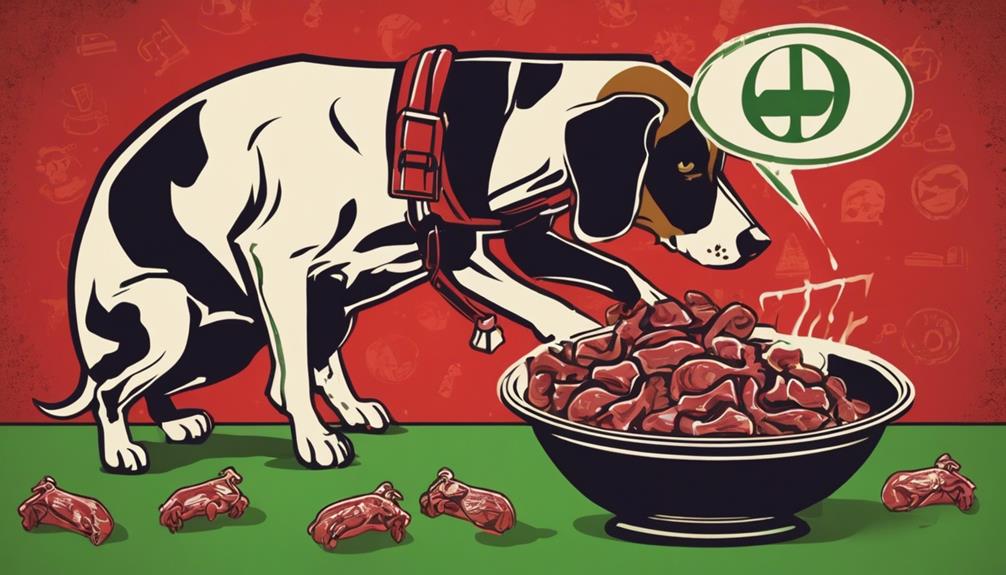
Goat meat can be a healthy addition to your dog’s diet, but there are some risks and safety measures you should consider. It’s a good idea to talk with your vet before giving your dog goat meat, especially if your dog has allergies to certain types of protein.
Make sure the goat meat is thoroughly cooked to avoid any bacterial infections that could be harmful to your pet.
You should also skip any goat meat that’s been seasoned or has spices since some ingredients might be harmful or cause stomach issues for your dog. It’s best to cut the meat into small pieces to prevent your dog from choking.
After your dog eats goat meat, watch for any signs of digestive trouble as a precaution for their health.
Incorporating Goat Meat
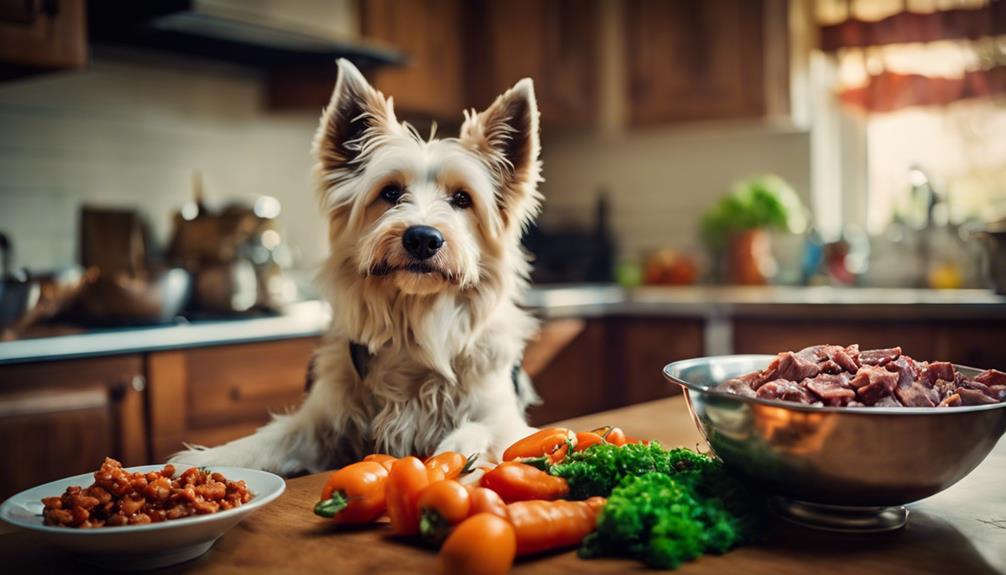
When considering adding goat meat to your dog’s diet, it’s important to talk with a veterinarian first. This step ensures the meat complements the nutritional requirements of your dog.
Goat meat can be a beneficial part of your pet’s diet, given its status as a distinctive protein source. However, to ensure its advantages and minimize potential risks, follow these guidelines:
Talk to a veterinarian before introducing goat meat to your dog’s diet. This professional advice ensures the meat suits your pet’s health and dietary needs. Keep the meat variety in your dog’s diet simple to make adding goat meat smoother. Cooking the goat meat thoroughly is crucial to eliminate the threat of bacterial contamination and foodborne diseases. It’s also important to serve the goat meat plain, without any spices, as certain seasonings might be toxic to dogs.
These steps help in making goat meat a nutritious and safe choice for your dog, enhancing their diet while keeping their health in check.
Goat Milk for Dogs
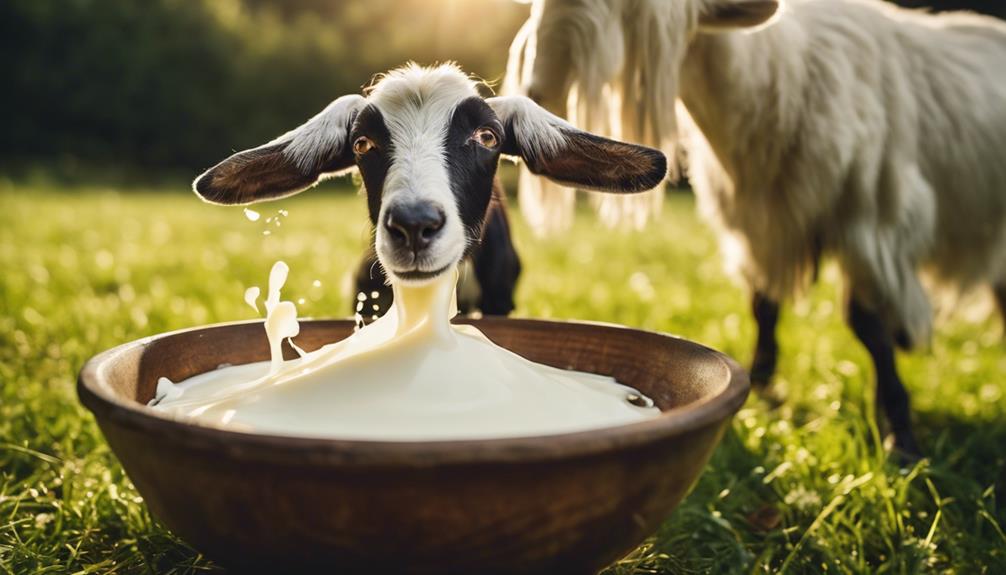
Goat milk is packed with nutrients that are beneficial for dogs, such as proteins, fats, vitamins, phosphate, calcium, potassium, and vitamin C. It’s a great source of nutrition, helping to meet the dietary requirements of your pet. This milk also contains valuable conjugated linoleic acids and vitamin A, which boost the immune system. Plus, it provides pre- and probiotics to support a healthy digestive system.
When introducing goat milk to your dog’s diet, it’s best to do so in moderation due to its rich composition. While goat cheese is not recommended because of its high-fat content, many dog foods and treats now include goat milk. This is because it’s full of vitamins and minerals that are good for your dog’s health.
Alternative Protein Sources
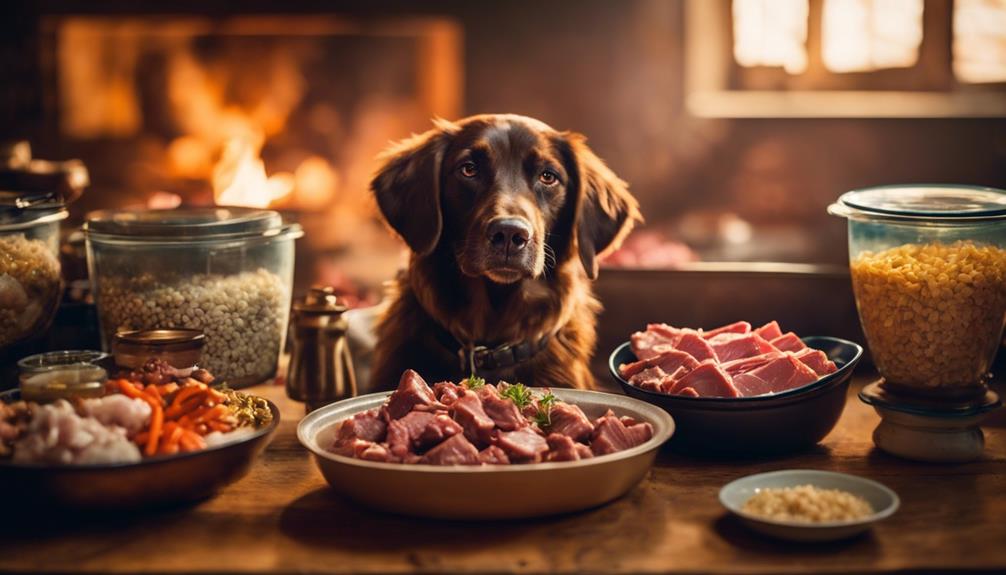
Goat meat is emerging as a great alternative protein for dogs, especially for those with allergies or sensitivities to common meats like beef or chicken. It’s a unique choice that might help dogs who struggle with these issues. Consulting a veterinarian is crucial to ensure it’s right for your pet’s diet.
Goat meat stands out as a novel protein source, which means it’s less likely to cause allergic reactions in dogs who can’t handle the usual options. If your dog has had problems with other meats, goat meat could be easier to digest. It’s also a nutritious option, offering a good alternative to more traditional meats.
Understanding Food Sensitivities
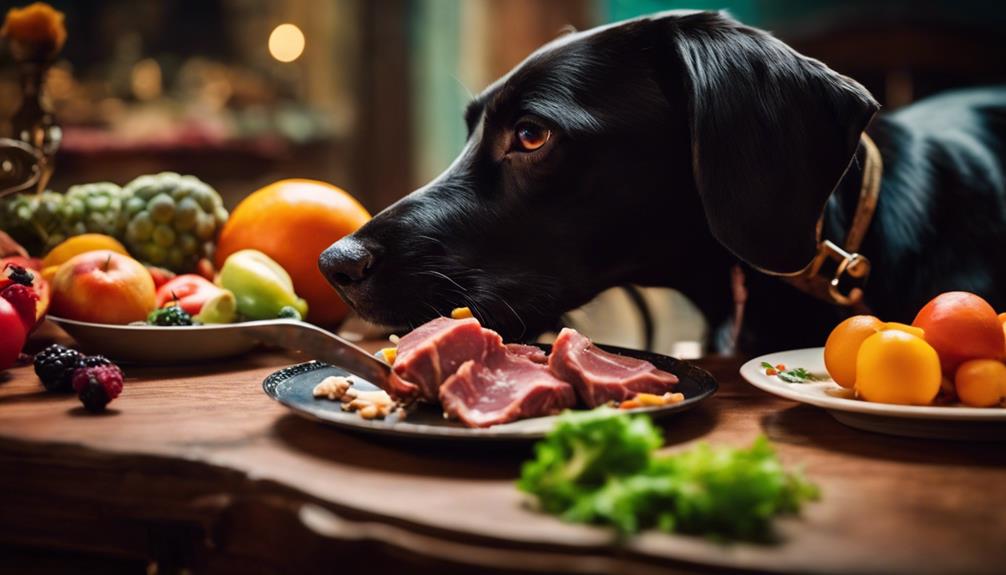
Understanding how goat meat affects dogs with food sensitivities is important. Knowing the signs of food allergies, like scratching, throwing up, and loose stools, helps keep your dog healthy.
Making diet changes safely, with a vet’s advice, can improve the life of dogs with food sensitivities.
Identifying Food Allergies
To pinpoint food allergies in dogs, vets often suggest trying an elimination diet or undergoing specific allergy tests. These allergies can cause a variety of symptoms, including skin issues and digestive problems, which are crucial to address for the health of your dog.
Elimination Diets involve carefully removing common allergens from your dog’s diet to identify what’s causing the allergic reactions. Watching for symptoms like itching, hives, swelling, vomiting, diarrhea, and in extreme cases, anaphylaxis is key to understanding the allergy.
Beef, chicken, dairy, wheat, soy, and corn are frequently to blame for these reactions. A vet’s guidance is crucial in overseeing the elimination diet and making sense of allergy test outcomes.
Taking this step-by-step approach may take time, but it’s necessary for effectively recognizing and managing your dog’s food allergies.
Common Sensitivity Symptoms
Recognizing common symptoms of food sensitivities in dogs is crucial for their well-being. Symptoms can range from itching and skin redness to ear infections and gastrointestinal issues like diarrhea and vomiting.
Dogs may also experience severe scratching, hair loss, hot spots, and anal gland problems. Behaviors such as paw licking, scooting, or yeast infections can also indicate food sensitivities.
Understanding these signs helps ensure the health and comfort of your dog by removing trigger foods from their diet.
Safe Dietary Changes
When considering dietary adjustments for dogs dealing with food sensitivities, introducing goat meat as a new protein source is a wise move. It’s an excellent choice for pets who may not tolerate common proteins such as beef or chicken well.
Goat meat stands out because it’s a less common allergen for dogs. This makes it a strong candidate for pets with dietary restrictions. Introducing goat meat slowly is key to monitoring how your dog reacts to this new protein. This approach helps in spotting any negative reactions early.
Offering goat meat can provide essential nutrients without the allergens often present in the usual dog food options. This strategy is crucial for better managing your dog’s food sensitivities, aiming for a happier and healthier life for your pet.
Monitoring Health Changes
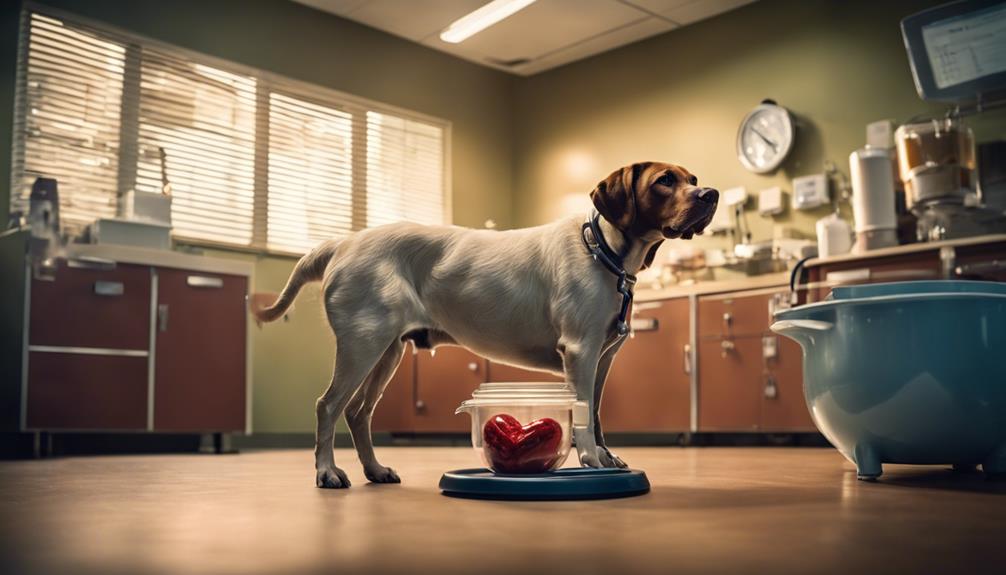
When you start feeding your dog goat meat, keeping an eye on their health is key to spotting any digestive problems or allergies. Goat meat can be a nutritious addition to a raw diet for dogs, but it’s critical to watch for any health changes. You should look out for signs related to their digestive system, how energetic they feel, and any unusual skin reactions. These observations help ensure your dog is adapting well to the new food.
| Aspect to Monitor | What to Look For | Action to Take |
|---|---|---|
| Digestive Health | Stomach upset, stool changes | Talk to a vet |
| Energy Levels | Any increase or decrease | Modify the diet as needed |
| Allergic Reactions | Skin issues, itching | Get advice from a vet |
| Stool Consistency | Stool too soft or hard | Tweak diet, seek vet advice |
| Overall Well-being | Behavioral changes | Schedule vet check-ups |
Having regular vet check-ups is crucial to ensure that including goat meat in your dog’s diet continues to be beneficial for their overall health.
Frequently Asked Questions
Is It Safe for Dogs to Eat Goat Meat?
- Properly cooked goat meat is a lean protein for dogs.
- Watch for allergic reactions in your dog.
- Ensure portions are suitable for your dog’s size.
Is Goat Easy to Digest for Dogs?
- Goat meat is nutritious and digestible for dogs.
- Cook it well to avoid allergic reactions.
- Follow feeding guidelines for dog’s health.
What Is the Healthiest Meat for Dogs?
- Chicken is a lean protein source.
- Beef boosts iron intake.
- Fish is rich in omega-3 acids; caution with pork.
Is Lamb or Goat Better for Dogs?
- Goat meat has less fat, healthier for dogs.
- Lamb may trigger allergies; goat is often safer.
- Assess cost and cooking before choosing meat for dogs.

